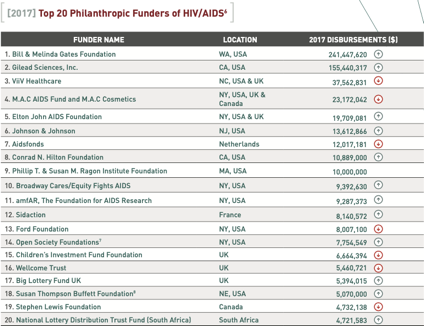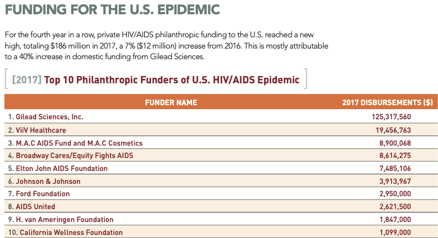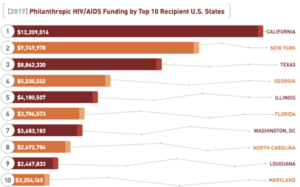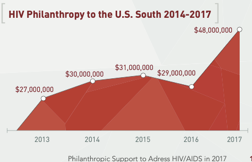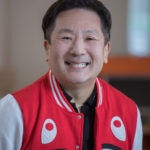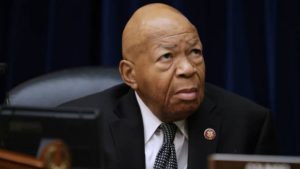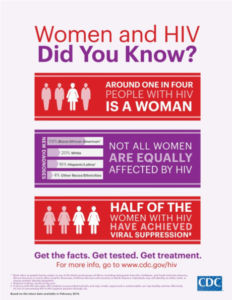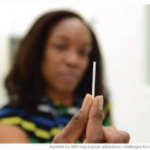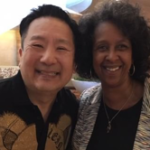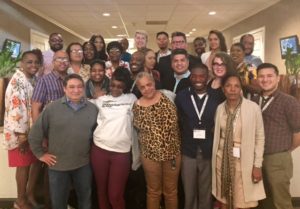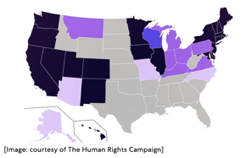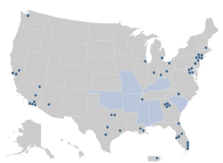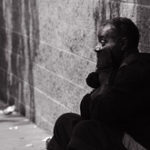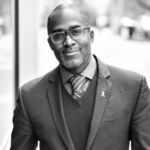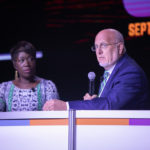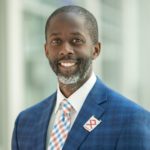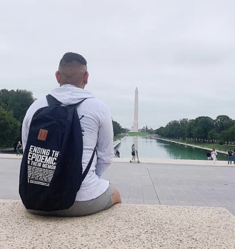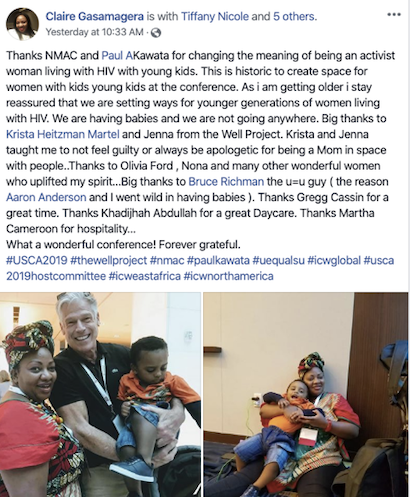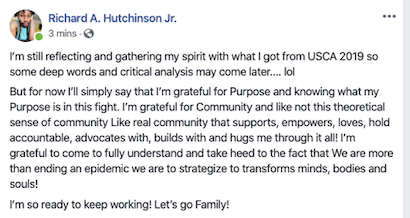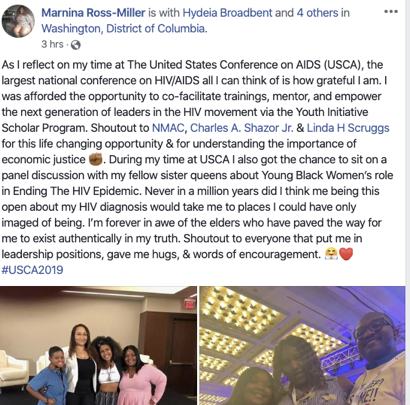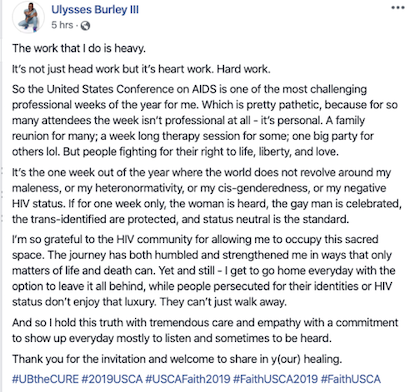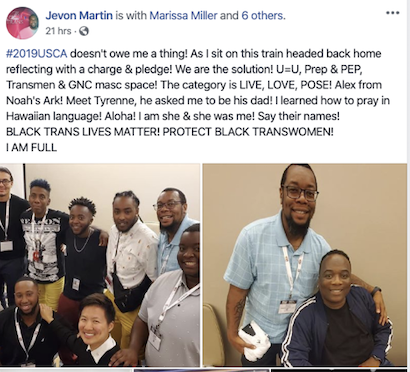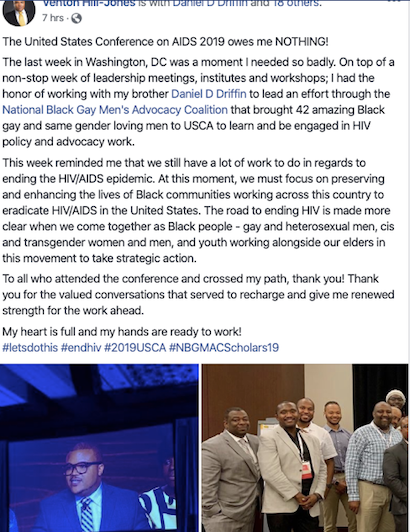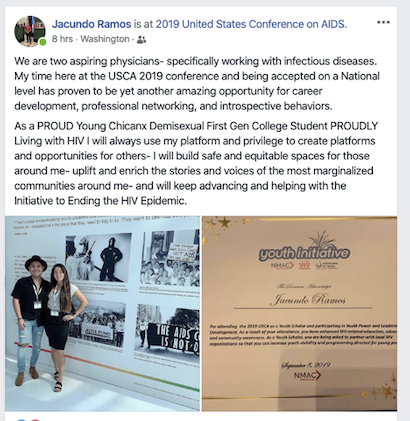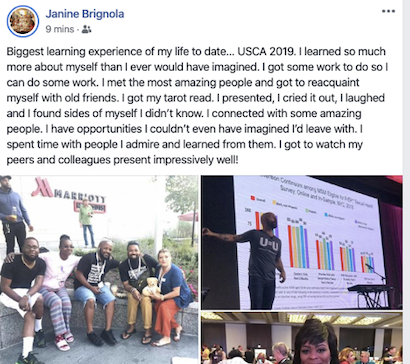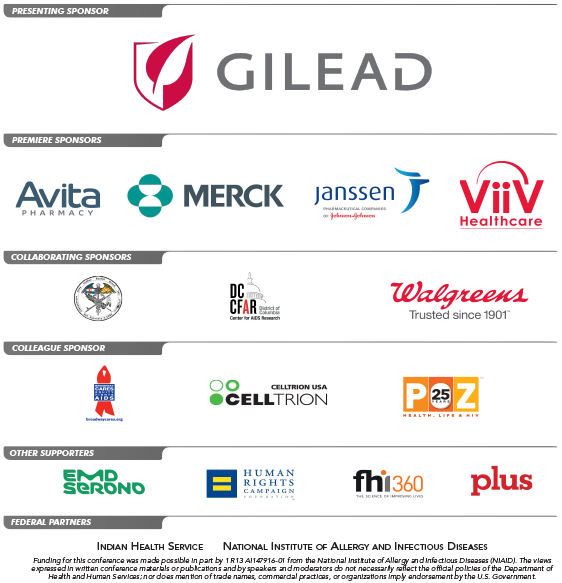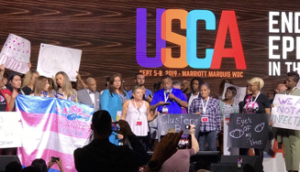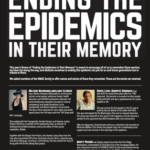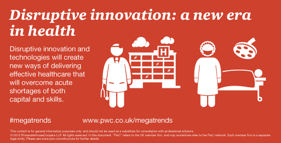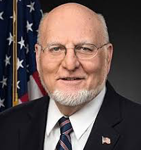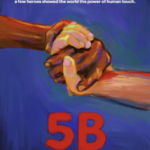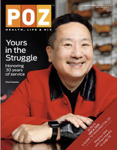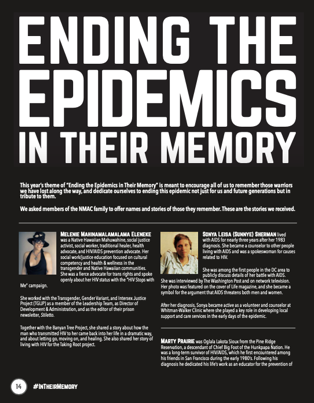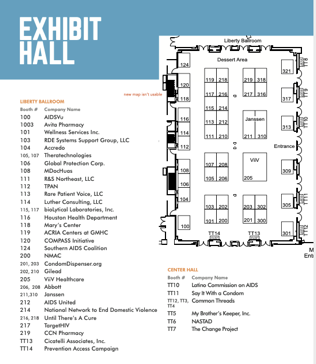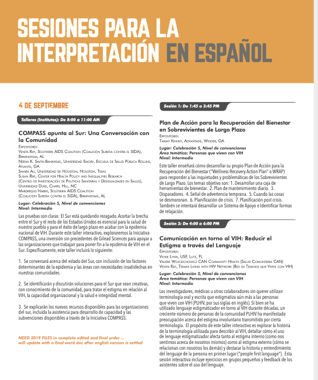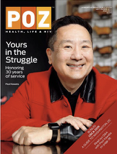 NMAC is proud to welcome this year’s USCA Social Media Fellows! Each year, 18 Fellows are selected to attend USCA to use their existing social media skills to help spread the word about HIV prevention, care, and treatment and expand their abilities through interacting with others in the field.
NMAC is proud to welcome this year’s USCA Social Media Fellows! Each year, 18 Fellows are selected to attend USCA to use their existing social media skills to help spread the word about HIV prevention, care, and treatment and expand their abilities through interacting with others in the field.
Davina Conner
Facebook: PozitivelyDee
Podcast: PozitivelyDeesDiscussion
Twitter: @DavinaConner
Instagram: @pozitivelydee
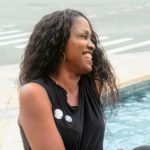 Davina Conner Otalor was diagnosed with HIV 22 years ago and her podcast has reached many for the last five years, educating by way of social media and community work to clarify the impact of HIV criminalization, seeking to dispel stigma, and address internalized stigma within people living with HIV. She uses her show as a platform to educate individuals who are HIV positive and HIV negative. Davina is an advocate/activist, speaker, radio host, a founding steering committee member of Prevention Access Campaign (UequalsU), a member of Positive Women’s Network USA’s Colorado Reginal Chapter, a 2020 Leading Women’s Society Alumni and a former Denver HIV Planning Council member. Dee’s podcast won the ADAP Social Media Campaign in 2017, the persistent advocate award at AIDS Watch 2019, and has also been featured in several magazines for her work. She founded her own non-profit organization 501c3 called Poz Haven Foundation that started out as grassroots advocacy. Her nonprofit works mentoring those who are diagnosed and individuals who are struggling mentally by way of telephone or in-home mentoring while bringing the often-underrepresented voice of women of color and women living with HIV to the table. Davina started advocating because of the stigma that many go through being diagnosed with HIV and is determined to work hard for women of color, trans women and all women with HIV. Davina uses her show as a platform to educate all communities and stands for the rights of every human being no matter how they chose to live their life. Dee’s big heart and the love she has for people shows while working to inspire, encourage and motivate all.
Davina Conner Otalor was diagnosed with HIV 22 years ago and her podcast has reached many for the last five years, educating by way of social media and community work to clarify the impact of HIV criminalization, seeking to dispel stigma, and address internalized stigma within people living with HIV. She uses her show as a platform to educate individuals who are HIV positive and HIV negative. Davina is an advocate/activist, speaker, radio host, a founding steering committee member of Prevention Access Campaign (UequalsU), a member of Positive Women’s Network USA’s Colorado Reginal Chapter, a 2020 Leading Women’s Society Alumni and a former Denver HIV Planning Council member. Dee’s podcast won the ADAP Social Media Campaign in 2017, the persistent advocate award at AIDS Watch 2019, and has also been featured in several magazines for her work. She founded her own non-profit organization 501c3 called Poz Haven Foundation that started out as grassroots advocacy. Her nonprofit works mentoring those who are diagnosed and individuals who are struggling mentally by way of telephone or in-home mentoring while bringing the often-underrepresented voice of women of color and women living with HIV to the table. Davina started advocating because of the stigma that many go through being diagnosed with HIV and is determined to work hard for women of color, trans women and all women with HIV. Davina uses her show as a platform to educate all communities and stands for the rights of every human being no matter how they chose to live their life. Dee’s big heart and the love she has for people shows while working to inspire, encourage and motivate all.
Jacen Zhu
 Twitter: @PrEPSQUADDC
Twitter: @PrEPSQUADDC
Jacen Zhu is a voice within the queer community who uses his platform in erotica to address issues affecting people of color (POC). He advocates primarily for black queer issues such as: racism within the industry, sexual & mental health, and substance use. Jacen utilizes his experience with addiction to start the initiative #TakedownTina. He also speaks about his journey being HIV positive living undetectably and the continued stigma within and out of the industry. He has partnered with PrEP Squad DC, as Undetectable Man to spread the message of U=U (Undetectable equals Untransmittable) in communities of color.
Jeffrey Long
Facebook: MyAdvocacyWorkJeffreyLong
 Jeffrey Long is an HIV, hepatitis, and harm reduction activist from Cherokee, NC. He has been extensively involved in federal, state, and tribal advocacy on behalf of people living with HIV and substance abuse disorder. Jeffrey currently sits on the Steering Committee for the North Carolina Ending the Epidemic initiative, as well as several boards and committees for the Western NC AIDS Project, based in Asheville.
Jeffrey Long is an HIV, hepatitis, and harm reduction activist from Cherokee, NC. He has been extensively involved in federal, state, and tribal advocacy on behalf of people living with HIV and substance abuse disorder. Jeffrey currently sits on the Steering Committee for the North Carolina Ending the Epidemic initiative, as well as several boards and committees for the Western NC AIDS Project, based in Asheville.
Lester Bloom

Lester Bloom goes by the name Tazzico. He was born, raised, and still resides in New Orleans, Louisiana. As a visual artist, he plays around with various mediums from painting to glassblowing to photography. He loves expressing himself and inspiring others through his artwork. You can find some of his artwork on Instagram.
Instagram: @Tazzico
Shyronn Jones
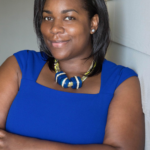 Shyronn Jones is a woman living with HIV, freelance writer, author, movie producer and cross-movement activist based in Atlanta, Georgia. She is the Founder of iknowAwareness LLC where she shares her personal experiences and education about HIV. She encourages others to “Educate About HIV With Care Not Fear” and to use people-first language. She leverages social media to bring information to community stakeholders and maintains a presence in HIV advocacy efforts in Metro Atlanta. She has amplified local, regional and national issues to bring about political and social change. As a Black woman living with HIV, she brings her perspective to movements like Black Lives Matter and Fight for $15. She is a dedicated member of the Positive Women’s Network-USA– serving as a Communication Action Team Member, Member Spokesperson, Policy Fellow, Certified Regional Trainer and Georgia State Lead. She also serves as the Interim Vice Chair of The Fulton County HIV/AIDS Prevention, Care and Policy Advisory Committee and a Member of The Metropolitan Atlanta HIV Health Services Planning Councils’ Priorities Committee.
Shyronn Jones is a woman living with HIV, freelance writer, author, movie producer and cross-movement activist based in Atlanta, Georgia. She is the Founder of iknowAwareness LLC where she shares her personal experiences and education about HIV. She encourages others to “Educate About HIV With Care Not Fear” and to use people-first language. She leverages social media to bring information to community stakeholders and maintains a presence in HIV advocacy efforts in Metro Atlanta. She has amplified local, regional and national issues to bring about political and social change. As a Black woman living with HIV, she brings her perspective to movements like Black Lives Matter and Fight for $15. She is a dedicated member of the Positive Women’s Network-USA– serving as a Communication Action Team Member, Member Spokesperson, Policy Fellow, Certified Regional Trainer and Georgia State Lead. She also serves as the Interim Vice Chair of The Fulton County HIV/AIDS Prevention, Care and Policy Advisory Committee and a Member of The Metropolitan Atlanta HIV Health Services Planning Councils’ Priorities Committee.
Website: www.iknowAwareness.com
Twitter: @shyronn_jones
Instagram: @shyronnjones
FB Group: iknowAwareness
FB Profile: shyronn
FB Page: PWNGA
LinkedIn: iknowawareness
YouTube: Shyronn Jones
Dimitri Moise
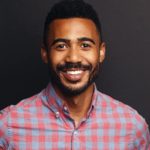 Dimitri Joseph Moise is an actor, award-winning editor, social entrepreneur, speaker, and advocate. He is notably known for his work as Mostel Defferies on The Last O.G. starring Tracy Morgan, on TBS. Dimitri is the founder of spl : inc, a consultancy focused on intentionally inclusive media; and the US Project Manager at Global Thinking Foundation, which promotes financial literacy and gender equality worldwide. Dimitri has also been featured on Good Morning America. As an advocate and spokesperson in the HIV/AIDS community, Dimitri dedicates his life to eradicating HIV stigma and addressing the disparities existing among marginalized communities. As an undetectable advocate, he has been featured in HIV Plus Magazine; Thought Catalog; and is a spokesperson for the nonprofit HIV Advocates. Dimitri is also nominated for three 2019 WEGO Health Awards. “Empowering others means empowering yourself.”
Dimitri Joseph Moise is an actor, award-winning editor, social entrepreneur, speaker, and advocate. He is notably known for his work as Mostel Defferies on The Last O.G. starring Tracy Morgan, on TBS. Dimitri is the founder of spl : inc, a consultancy focused on intentionally inclusive media; and the US Project Manager at Global Thinking Foundation, which promotes financial literacy and gender equality worldwide. Dimitri has also been featured on Good Morning America. As an advocate and spokesperson in the HIV/AIDS community, Dimitri dedicates his life to eradicating HIV stigma and addressing the disparities existing among marginalized communities. As an undetectable advocate, he has been featured in HIV Plus Magazine; Thought Catalog; and is a spokesperson for the nonprofit HIV Advocates. Dimitri is also nominated for three 2019 WEGO Health Awards. “Empowering others means empowering yourself.”
Facebook Profile: dimitri.moise
Facebook Fan Page: https://www.facebook.com/DimitriMoiseOfficial/
Instagram: dimitrimoiseofficial
Twitter: dimitrijmoise
LinkedIn: dimitrijosephmoise
Dernell Green
 Dernell E. Green is the 3MV Director/ Social Media/Marketing Coordinator at Brotherhood, Incorporated in New Orleans, Louisiana. Before working at Brotherhood he was a school teacher by day photographer and graphic designer by night. Dernell has attended the University of Louisiana at Lafayette & Dillard University where he majored in Public Relations and Music. He became an advocate in the HIV field when he realized that he influenced so many of his friends and followers’ actions in life. Since being at Brotherhood for the past two years Dernell has impacted over 100+ college students to simply “Know Your Status” by taking a Rapid HIV test with his agency. Also, he created avenues and outlets for students/community to just have somewhere to go enjoy each other’s company and more, from POSE Watch Parties to Good Friday Shakedowns. Being a voice and giving the kids what they want has always been his ultimate purpose in life.
Dernell E. Green is the 3MV Director/ Social Media/Marketing Coordinator at Brotherhood, Incorporated in New Orleans, Louisiana. Before working at Brotherhood he was a school teacher by day photographer and graphic designer by night. Dernell has attended the University of Louisiana at Lafayette & Dillard University where he majored in Public Relations and Music. He became an advocate in the HIV field when he realized that he influenced so many of his friends and followers’ actions in life. Since being at Brotherhood for the past two years Dernell has impacted over 100+ college students to simply “Know Your Status” by taking a Rapid HIV test with his agency. Also, he created avenues and outlets for students/community to just have somewhere to go enjoy each other’s company and more, from POSE Watch Parties to Good Friday Shakedowns. Being a voice and giving the kids what they want has always been his ultimate purpose in life.
Insta: @blazerndbowtie
Twitter: @blazerndbowtie
Facebook: kydd.mychal
James Q. Simmons
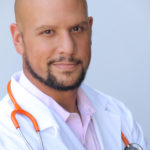 James Q. Simmons is a Board Certified Acute Care Nurse Practitioner and on-air medical expert currently working on his Doctorate in Nursing Practice at UCLA. His research is focused on understanding the impact of social media on initiation of PrEP in the Black MSM community. He also curates the online and social media health initiative “Ask The NP – everything you’re too scared to ask your MD!” A safe space on social media where followers get real, relatable, and reliable information to empower their health. He is on the Advisory Board for APAIT, an organization working to positively impact the quality of life for medically under served communities living with or at risk for HIV/AIDS and other health disparities through culturally competent and linguistically appropriate programs in Southern California. He believes strongly in NMAC’s mission of leading with race to end the HIV epidemic in all communities and is honored to be a Social Media Fellow at his first ever United States Conference on AIDS.
James Q. Simmons is a Board Certified Acute Care Nurse Practitioner and on-air medical expert currently working on his Doctorate in Nursing Practice at UCLA. His research is focused on understanding the impact of social media on initiation of PrEP in the Black MSM community. He also curates the online and social media health initiative “Ask The NP – everything you’re too scared to ask your MD!” A safe space on social media where followers get real, relatable, and reliable information to empower their health. He is on the Advisory Board for APAIT, an organization working to positively impact the quality of life for medically under served communities living with or at risk for HIV/AIDS and other health disparities through culturally competent and linguistically appropriate programs in Southern California. He believes strongly in NMAC’s mission of leading with race to end the HIV epidemic in all communities and is honored to be a Social Media Fellow at his first ever United States Conference on AIDS.
Twitter: @AskTheNP
Instagram: @AskTheNP
Facebook: AskTheNP
YouTube: AskTheNP
Hernando Umana
 Hernando Umana has been seen on Broadway and National tours with Kinky Boots and School of Rock. He recently launched a premium line of CBD products for pets called CBD Dog Health (@cbddoghealth) and promotes medicinal cannabis as an activist. Diagnosed with HIV 11 years ago, Hernando decided to come out publicly with his status. Since then he’s worked as an activist with features in Esquire, Poz Magazine, the U=U campaign all over New York and more.
Hernando Umana has been seen on Broadway and National tours with Kinky Boots and School of Rock. He recently launched a premium line of CBD products for pets called CBD Dog Health (@cbddoghealth) and promotes medicinal cannabis as an activist. Diagnosed with HIV 11 years ago, Hernando decided to come out publicly with his status. Since then he’s worked as an activist with features in Esquire, Poz Magazine, the U=U campaign all over New York and more.
Twitter: @hernandoumana
Instagram: @Hernandoumana
Ian L. Haddock
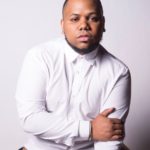 Ian L. Haddock (he, him, his) is a black, gay/queer/pansexual male residing in Houston, Texas. He is the Executive Director of The Normal Anomaly Initiative and the President of Impulse Group Houston. He is the Executive Producer of Outcry the Mini Doc streaming on Amazon Prime Video and the forthcoming docu-series to be released in Fall 2019. He also serves as a host of The Real Gag Internet Radio Show. Haddock is the 2019 Trailblazer of the Year from the African American State of Emergency Task Force and was awarded as the 2019 Dr. Mark A Colomb Emerging Young Leader from the National African American Leadership Conference.
Ian L. Haddock (he, him, his) is a black, gay/queer/pansexual male residing in Houston, Texas. He is the Executive Director of The Normal Anomaly Initiative and the President of Impulse Group Houston. He is the Executive Producer of Outcry the Mini Doc streaming on Amazon Prime Video and the forthcoming docu-series to be released in Fall 2019. He also serves as a host of The Real Gag Internet Radio Show. Haddock is the 2019 Trailblazer of the Year from the African American State of Emergency Task Force and was awarded as the 2019 Dr. Mark A Colomb Emerging Young Leader from the National African American Leadership Conference.
Facebook: ianlhaddock
Facebook Page: Normal Anomaly
Instagram: @thenormalanomaly
Twitter:@DaNormalAnomaly
D’Ontace Keyes
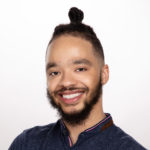 [D’Angelo] D’Ontace Keyes is the Digital Communication Manager at the AIDS Foundation of Chicago (AFC) where he executes content distribution and social media strategies. Keyes previous led marketing and fundraising activities for Philadelphia Black Pride and served as a content producer for MOBI (Mobilizing Our Brothers Initiative) in New York City. Keyes received his MBA in Marketing with a focus in Innovation from Philadelphia University and formal arts education from The University of the Arts. Since postgrad, Keyes has worked with teams from the Center for Quality Improvement and Innovation, Pride Action Tank and GLSEN to adopt design mapping for developing innovative solutions to issues impacting youth in healthcare, welfare and education systems. A dedicated public servant, Keyes previously served as a commissioner with Philadelphia Commission on Human Relations, where he assisted in developing the first government level report addressing racism and discrimination in Philadelphia’s LGBTQ community.
[D’Angelo] D’Ontace Keyes is the Digital Communication Manager at the AIDS Foundation of Chicago (AFC) where he executes content distribution and social media strategies. Keyes previous led marketing and fundraising activities for Philadelphia Black Pride and served as a content producer for MOBI (Mobilizing Our Brothers Initiative) in New York City. Keyes received his MBA in Marketing with a focus in Innovation from Philadelphia University and formal arts education from The University of the Arts. Since postgrad, Keyes has worked with teams from the Center for Quality Improvement and Innovation, Pride Action Tank and GLSEN to adopt design mapping for developing innovative solutions to issues impacting youth in healthcare, welfare and education systems. A dedicated public servant, Keyes previously served as a commissioner with Philadelphia Commission on Human Relations, where he assisted in developing the first government level report addressing racism and discrimination in Philadelphia’s LGBTQ community.
Facebook: AIDS Chicago
IG: @aidsfoundationchicago
Facebook: D.Ontace
IG: @mrkeyes
Melanie Ampon
 Melanie Ampon, a California Bay Area native, is a passionate advocate for transgender and human rights. She is a Human Rights Commissioner for the City and County of San Francisco. She has worked at San Francisco’s transgender cabaret dining club, AsiaSF since 2003. She was in a national television program in 2015-16 called Transcendent, that chronicled 5 trans women navigating their personal and professional lives in San Francisco. It was one of the first all-trans docu-series television programs. It helped give light and understanding of the transgender community from an entertainer’s point of view.
Melanie Ampon, a California Bay Area native, is a passionate advocate for transgender and human rights. She is a Human Rights Commissioner for the City and County of San Francisco. She has worked at San Francisco’s transgender cabaret dining club, AsiaSF since 2003. She was in a national television program in 2015-16 called Transcendent, that chronicled 5 trans women navigating their personal and professional lives in San Francisco. It was one of the first all-trans docu-series television programs. It helped give light and understanding of the transgender community from an entertainer’s point of view.
Melanie is co-chair of the HRC’s LGBT Advisory Committee (LGBTAC), a Community Advisory Board (CAB) member at the San Francisco Community Health Center (SFCHC), and is also a Transgender Advisory Committee (TAC) member at the Office of Transgender Initiatives (OTI) the first Trans lead City Office in the nation. She has lent her voice to host numerous events for organizations such as Transgender Day of Visibility (TDOV), SF Trans March, The Trevor Project, and more.
Instagram: @nyacruz
Twitter: @nyaasiasf
Tiana Jones
 Tiana Jones is a 24-year-old born and raised Las Vegas native. Tiana is a current Master of Public Health student at Grand Canyon University with a bachelor’s degree in Public Health from the University of Nevada-Reno. Her advocacy for HIV/AIDS started with the passing of her Aunt Rhonda in 1994 from AIDs related complications. During her undergrad, she was a Peer Health Educator where she helped assist with free STI testing weekly. She was an intern for Northern Nevada Hopes in Reno, Nevada, which was the first HIV treatment clinic in the state. Today she is serving her community as an HIV Program Specialist in Las Vegas. Her future includes becoming a well-known advocate for HIV/AIDs not only in Nevada but in the United States through social media. Tiana also known as “TIANAAWOAH’’ on YouTube, started her channel in 2015 focusing on hair tutorials, fashion hauls, and lifestyle experiences. She believes that if you allow the conversation around HIV treatment and prevention to become normalized, then we as people will be on our way to ending stigma and the epidemic. It’s not easy being an advocate for HIV, but if it was, everyone would do it. That is why it’s important to continue to educate our peers, our family, and strangers on the importance of getting tested, getting treatment, prevention and simply staying educated. Driven by her strong belief in the value of human life and dignity of all people, her ultimate goal is to provide support for the most marginalized and underserved populations affected by HIV. Tiana is excited to be at USCA for the first time and cannot wait to meet and learn from all the fabulous attendees.
Tiana Jones is a 24-year-old born and raised Las Vegas native. Tiana is a current Master of Public Health student at Grand Canyon University with a bachelor’s degree in Public Health from the University of Nevada-Reno. Her advocacy for HIV/AIDS started with the passing of her Aunt Rhonda in 1994 from AIDs related complications. During her undergrad, she was a Peer Health Educator where she helped assist with free STI testing weekly. She was an intern for Northern Nevada Hopes in Reno, Nevada, which was the first HIV treatment clinic in the state. Today she is serving her community as an HIV Program Specialist in Las Vegas. Her future includes becoming a well-known advocate for HIV/AIDs not only in Nevada but in the United States through social media. Tiana also known as “TIANAAWOAH’’ on YouTube, started her channel in 2015 focusing on hair tutorials, fashion hauls, and lifestyle experiences. She believes that if you allow the conversation around HIV treatment and prevention to become normalized, then we as people will be on our way to ending stigma and the epidemic. It’s not easy being an advocate for HIV, but if it was, everyone would do it. That is why it’s important to continue to educate our peers, our family, and strangers on the importance of getting tested, getting treatment, prevention and simply staying educated. Driven by her strong belief in the value of human life and dignity of all people, her ultimate goal is to provide support for the most marginalized and underserved populations affected by HIV. Tiana is excited to be at USCA for the first time and cannot wait to meet and learn from all the fabulous attendees.
Instagram: @tianaawoah
YouTube: TianaaWoah
Lillian Lennon
 Lillian Lennon is a queer woman who is proud to call Talkeetna and Anchorage, Alaska her home. Her career in activism started with the cofounding of Talkeetna Pride, her hometown’s first LGBTQ+ organization. After moving back to Anchorage for school she became the field organizer for the successful Fair Anchorage campaign that took down the transphobic ballot initiative known as Proposition 1. Since then she has been a freelance activist and recently an LGBTQ+ field organizer for Planned Parenthood and Transgender Leadership Alaska. In her free time, she enjoys illustrating, filmmaking, and jamming out on the ukulele.
Lillian Lennon is a queer woman who is proud to call Talkeetna and Anchorage, Alaska her home. Her career in activism started with the cofounding of Talkeetna Pride, her hometown’s first LGBTQ+ organization. After moving back to Anchorage for school she became the field organizer for the successful Fair Anchorage campaign that took down the transphobic ballot initiative known as Proposition 1. Since then she has been a freelance activist and recently an LGBTQ+ field organizer for Planned Parenthood and Transgender Leadership Alaska. In her free time, she enjoys illustrating, filmmaking, and jamming out on the ukulele.
Social Media Links:
Twitter: @mslillianlennon
Instagram: @mslillianlennon
Raif Derrazi
 Raif was diagnosed with AIDS on his 27th birthday in 2012. This was his greatest fear in life and he soon realized his ‘victim mindset’ is what brought him down this long circuitous journey to his current circumstances. A LOT had to change both internally and externally for him to regain control of his life. He did a lot of internal work and started to take a leadership role in his life with the intention of being his own hero! Fitness and bodybuilding were a natural fit and a great outward manifestation of his new-found power. Raif is now a pro natural competitive physique bodybuilder. He also realized that role models for the HIV community were hard to come by so he decided to start talking about his HIV status on social media in hopes of providing guidance and inspiration to others. With a growing YouTube subscribership (10k) and following on Instagram (23k), he shares his life and his journey living with HIV and embracing a fitness lifestyle. What was originally his worst fear, has now become the biggest blessing in disguise as Raif is happier and healthier than he has ever been with a new found purpose and passion for being an example and helping others.
Raif was diagnosed with AIDS on his 27th birthday in 2012. This was his greatest fear in life and he soon realized his ‘victim mindset’ is what brought him down this long circuitous journey to his current circumstances. A LOT had to change both internally and externally for him to regain control of his life. He did a lot of internal work and started to take a leadership role in his life with the intention of being his own hero! Fitness and bodybuilding were a natural fit and a great outward manifestation of his new-found power. Raif is now a pro natural competitive physique bodybuilder. He also realized that role models for the HIV community were hard to come by so he decided to start talking about his HIV status on social media in hopes of providing guidance and inspiration to others. With a growing YouTube subscribership (10k) and following on Instagram (23k), he shares his life and his journey living with HIV and embracing a fitness lifestyle. What was originally his worst fear, has now become the biggest blessing in disguise as Raif is happier and healthier than he has ever been with a new found purpose and passion for being an example and helping others.
YouTube:raifderrazi
Instagram: @raifderrazi
Twitter: @rderrazi
Brandon Bright
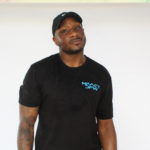 Brandon Bright is from from Ft. Worth, TX. He started work with the AIDS Outreach Center in 2017 as an Outreach Worker and is now spearheading MPact DFW. MPact DFW is part of the Empowerment intervention, which is geared towards young gay men of color. He is looking forward to learning ways that he can enhance his social media outreach.
Brandon Bright is from from Ft. Worth, TX. He started work with the AIDS Outreach Center in 2017 as an Outreach Worker and is now spearheading MPact DFW. MPact DFW is part of the Empowerment intervention, which is geared towards young gay men of color. He is looking forward to learning ways that he can enhance his social media outreach.
FB: MPACT DFW
IG: @MPACT DFW
Lateef D Hudson
 Lateef D Hudson was born and raised in Detroit Michigan. He identifies in the LGBTQ community where he tries to teach and learn from the youth as much as possible in bettering his community. Lateef worked with the non-profit Ruth Ellis, volunteering and interning for five years before becoming a member of their LGBT youth advisory board. Lateef has been in and out of foster care for as long as he remembers, bouncing from home to home but also picking up on some skills like problem-solving, self-confidence, strong work ethic and many more. In October 2018, he started his journey by becoming a linkage specialist at the Detroit Health Department. Lateef is a young and energetic person who, like most of the youth of today, uses way to much social media but also knows the ins and outs of it in to regards to reaching out to his own generation and those that came after him. He does not let any obstacles get in his way, he perseveres and keeps working towards his dreams.
Lateef D Hudson was born and raised in Detroit Michigan. He identifies in the LGBTQ community where he tries to teach and learn from the youth as much as possible in bettering his community. Lateef worked with the non-profit Ruth Ellis, volunteering and interning for five years before becoming a member of their LGBT youth advisory board. Lateef has been in and out of foster care for as long as he remembers, bouncing from home to home but also picking up on some skills like problem-solving, self-confidence, strong work ethic and many more. In October 2018, he started his journey by becoming a linkage specialist at the Detroit Health Department. Lateef is a young and energetic person who, like most of the youth of today, uses way to much social media but also knows the ins and outs of it in to regards to reaching out to his own generation and those that came after him. He does not let any obstacles get in his way, he perseveres and keeps working towards his dreams.
Facebook: Linkup Detroit
Maria Meija
 Maria is the co-author of the book from a “Warrior’s Passion and Pain,” a real life account of her 30-year battle with HIV. She is currently the co-chair of the Women and Minorities Outreach for the Dab the AIDS bear project. Maria is a part of the campaign “Let’s Stop HIV Together” for the Center for Disease Control as their ambassador. She is also an ambassador for a Greater
Maria is the co-author of the book from a “Warrior’s Passion and Pain,” a real life account of her 30-year battle with HIV. She is currently the co-chair of the Women and Minorities Outreach for the Dab the AIDS bear project. Maria is a part of the campaign “Let’s Stop HIV Together” for the Center for Disease Control as their ambassador. She is also an ambassador for a Greater
than AIDS ongoing campaign for women, HIV, Trauma, and IPV, “The Stigma Project, and the global ambassador and CAB member for the women’s organization “The Well Project.” Diagnosed with HIV in 1991 after contracting it in 1988 at the age of 15, Maria began a long journey finding hope, pride, and passion in an undereducated society unprepared to deal with the growing epidemic of HIV and AIDS. After ten years without treatment, Maria found herself at a crossroads. She could begin medical treatment or continue to slide towards death. Thankfully she chose to live and to fight for more than just her own health.
Maria immersed herself in HIV/AIDS education and became a powerful activist for education, treatment, testing, prevention, LGBTQ, and human rights. She has been featured in magazines, billboards, TV, as well as national and international conventions. Maria has been a part of four documentaries to help raise HIV awareness. She is a volunteer for the Red Cross, an HIV educator for Jackson Memorial Hospital and a motivational speaker. She is an HIV consultant and a member of several digital advisory boards: Janssen Pharmaceuticals Digital advisory board, Community Advisory Board of The Well Project, and sits on the Board of Directors “CANN” in Washington, DC.
Her extensive social media involvement is included below. Maria’s book from a “Warrior’s Passion and Pain” has made her message very clear: she is far more than a condition. Her personal journey through life is a moving account of survival. HIV has been only one of her many challenges.
Today Maria lives in Ft. Lauderdale, Florida. She continues to build support, educate, and encourage testing and health care in a city with one of the highest new HIV infection rates in the country.
Maria es la co-autora del libro Desde la Pasión y dolor de una guerrera, una historia de la vida real de su batalla de 30 años con el VIH y su vida. Actualmente es co-presidente de la Divulgación Mujeres y Minorías de Dab The AIDS bear project.
Maria hace parte de la campaña “Detengamos el VIH Juntos” como su embajadora para el Centro de Control de Enfermedades, tambien es embajadora de “The Stigma Project” y es la Embajadora Global y CAB de la Organizacion global para mujeres y chicas “The Well Project” tambien Embajadora de Greater than AIDS y su campana “VIH,Trauma,mujeres y violencia”.
Diagnosticada con el VIH en 1991e infectada en 1988 a la edad de 15 anos, Maria comenzó una larga travesia de esperanza, orgullo y pasión en una sociedad sin educación que están preparados para hacer frente a la creciente epidemia de VIH y SIDA. Después de diez años sin tratamiento Maria se encontró en una encrucijada. Ella podría comenzar el tratamiento médico o continuar a deslizarse hacia la muerte. Afortunadamente ella eligió vivir y luchar por algo más que su propia salud.
Maria se sumergió en la educación sobre el VIH / SIDA y se convirtió en un activista de gran alcance para la educación, el tratamiento, las pruebas y la prevención, para la comunidad LGBTQ y derechos humanos. Ella ha aparecido en revistas, vallas publicitarias, televisión, Radio así como las convenciones nacionales e internacionales.
María ha sido parte de cuatro documentales para ayudar a crear conciencia del VIH. Ella es una voluntaria de la Cruz Roja, un educador de VIH para el Hospital Jackson Memorial y un orador motivacional. Ella es asesora de VIH y miembra de varios asesorias digitales: Janssen Pharmaceuticals , Miembra de asesoria para comunidades para The Well project y se sienta en
la junta directiva en Washington “CANN”
Su amplia participación de los medios sociales es extensivo e incluye el libro de Maria Desde la”pasion u el dolor de una guerrero, ella tiene un mensaje muy claro: ella es mucho más que una condicion. Su trayecto por la vida es un relato conmovedor de la supervivencia.
El VIH ha sido sólo uno de sus muchos retos. Hoy María vive en Ft Lauderdale, Florida. Ella continúa construyendo apoyo, educacion y anima a las pruebas y el cuidado de la salud en una ciudad con una de las tasas de nuevas infecciones de VIH más altas del país.
Follow Maria on Twitter at @mariahivmejia
Instagram: MariaHIVMejia
FB: https://mariahivmejia
YouTube: Maria Mejia
English Facebook page: MariaHIV
Spanish: mariahiv1111
Read Maria’s blogs at:
The well project (a girl like me)
Thebody.com
Until there’s a cure
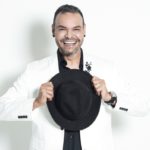 Enrique Salas
Enrique Salas
Instagram: @Salas_enrique
I was born in Maracaibo, State of Zulia, Venezuela in 1968. I did the primary school and high school in my hometown; there I began to combine my academic studies with my initiation into the world of music and theater integrating Youth Music Orchestra and Dór theater group where I took my first steps in performing arts.
In 1984 I did professional studies in music theory. I also studied piano and violin at the State of Zulia Music Conservatory. Simultaneously I became part of the State’s Juvenile Orchestra where I spent two consecutive years in the strings ensemble. In parallel I participated as an actor in DORgroup plays: “El Cubo” and “Requiem for El Saladillo”, winning several awards at student festivals which motivated me to move to the city of Caracas, capital of Venezuela in 1987, to continue my career in the arts. Once settled in Caracas I joined the Anna Julia Rojas Theatre Laboratory and the National Youth Theatre, where he participated as an actor and production assistant in the play “Hamlet” directed by Master Horacio Peterson (1989). It is in 1992 when I first participated as a director and author of the monologue “Mi Mejor Marido” starred by Venezuelan actress Carolina Lopez during Caracas’ International Theater Festival in 1992. That same year I worked as the producer of the soap opera “Amor de Papel” which aired nationally Venevision, and for fourconsecutive years and I was part of the cast of the sitcom” Cheverisimo”, also from the said television channel.
In 1997, I graduated as Bachelor in Theatre mention Production Management at the Theater University College, then directed by prominent writer and Venezuelan theatrical manager Pilar Romero. Since then I have worked with: Compañia Lili Alvarez Sierra, Centro de Directores para el Nuevo Teatro (New Theater Directors Center) l.E.Producciones C.A where I’ve directed Elizabeth Fuentes play “My husband is a cuckold” masterfully acted by Venezuelan leading actress Elba Escobar, and as Playwright I premiered my big theatrical success “Drunken Tales” the latter with over 700 performances, well received in all of Venezuela’s cities and in New York and Washington. In Arte y Parte Producciones, I served as general producer of “The World of Oz” musical, “The Sleeping Beauty and Prince Valiant” and “Hercules the hero of the Stars”, and with my own theater company 13 Producciones C.A. I work as a playwright, director and executive producer for the plays: “Se abrio la Jaula” (The Cage is Open),”Reflexiones con 3 de Ellos” (Reflections with three of them), “Mujeres Infieles” (Unfaithful Women) and “Relatos Borrachos” (Drunken Tales) all these presented national and internationally.
In late 2013 I obtain a diploma in Dramaturgy from the School of Arts at Universidad Central de Venezuela. In 2014, I wrote the comedy “Divorciemonos, Cariño” for Caracuchos Producciones C.A., starring leading Venezuelan actor artistic Jean Carlos Simancas, along with Josemith Bermudezand Adrian J Matos, this production was directed by leading Venezuelan actress and director Elba Escobar and has performed at full house in Miami and Venezuela’s major cities, always receiving ovations. For Caracuchos Producciones C.A. I also wrote the short play “El Sauna” (The Sauna) which was a blockbuster in the ¼ First Theater Festival in Caracas, Venezuela, where he also participated as a playwright of the play “ElAvila” which received beautiful accolades from the national critique. Two months after, I write for the ¼ Theater second edition “Sin Pecado Concebida” (Conceived without Sin), produced at that time by MP Producciones, C.A which was also a resounding success, and premiers his latest production “Beba en Cabaret” with Venezuelan international actress Beba Rojas”.
“The Sauna” was presented in Madrid, Spain, and Miami hi enjoys the success of his short plays “Sin Pecado Concebida” (Conceived without Sin) in the Passion of Micro Theater Miami season with wonderful performances by: Maria Cecilia Oduber Indira Leal and Ana Gabriela Barboza. He produced the play “Casting Express” starring Flor Elena González, Josette Vidal Restifo and Indira Leal. Then he continues as writer and director of “Confesiones de Alcoba (Bedroom Confessions)” starring: Andreina Yepez and Moises Gonzalez also presented in Micro Theater Miami, “Gorda y Gordo” written and directed byme. This play was also presented in “Micro Theater Guadalajara” in Mexico, from 12 June to 12 July. In MiamiI presented the short play “Brindaremos por ti,” of my authorship; all presented with great success inthe MicroTheater of the Spanish Cultural Center.
At the same time I work on the dialogue “Live to Love” soap opera, original from Cesar Sierra and that will air in Venezuela and great part of Latin America.
For the opening of the Paseo de las Artes in the city of Doral, I produce Fernando Martinez play “Feroz” and premiere my successful piece “Mujeres Infieles” in the “Hoy Como Ayer” club at Miami 8th Street with international actresses Martha Picanes Martha (Cuban), Denise Sanchez (Puerto Rican) and Venezuelan Andreina Yepez this in May 2015. At the same time I premiere “Relatos Borrachos” with performances by Elba Escobar (International Actress), Alba Roversi (International Actress) and Daniel Sarcos (Host of Telemundo morning show “Un Nuevo día”), on 19 and 20 June 2015 in the prestigious Trail Theatre 8th Street Miami, with great success, being sold out it is decided to extend the season for another weekend of July, and every Thursday of October, starting the US tour in Houston where a function was held, also sold out, at the newly opened
Queensbury theater.
In parallel, in The Walkk of Arts in the city of Doral, I have directed and produced Monica Montañez “La Ilamadita”, Ignacio lzcaray “La viuda de Gardel” and José Luis Useche “En la quinta paila” and wrote “A mi me llaman la Wendy” and “El amor si existe, cuesta 10000 pesos”; “El Avila” “Religiosas Navigay”, and direction and production of Elizabeth Fuentes “My Husband is a Cuckhold” starring Venezuelan leading actress Elba Escobar. In 2016, among other projects I presented my plays “La Tóxica” “Gulamia” “Demonios Sueltos” y “Se abrio la Jaula”, a piece that had great success in Venezuelan, and now will be produced with an international cast
Nace en Maracaibo, Edo. Zulia Venezuela 1968. Realiza estudios de primaria y bachillerato e inicia sus estudios academicos de música -teatro en la estudiantina juvenil Zuliana y el grupo teatral Dór.
En 1984 estudia piano y violín en el Conservatorio de Música del Edo. Zulia. Se integra a la Orquesta Juvenil del Estado donde permanece en el grupo de cuerdas por dos años.
Como actor participa en las obras: “El Cubo” y “Requién por el Saladillo” del grupo Dór, opteniendo varios premios en festivales estudiantiles, en el 1987 se trasladarse a la capital de Venezuela para continuar ahí con su preparación en las artes. Se integra a la compañía de Teatro Nacional Juvenil, como actor y asistente de producción en la obra “Hamlet” dirigina por el maestro Horacio Peterson (1989) en el (1992) Debuta como director y autor del monólogo “Mi Mejor Marido” con la actriz venezolana Carolina López en el off festival del Festival Internacional de Teatro Caracas 1992, ese mismo año es contratado como productor de la telenovela “Amor de Papel” y por cuatro años consecutivos forma parte del elenco de actores del programa “Cheverisimo” trasmitido por Venevisión.
En 1997, se gradúa de Licenciado en Teatro mensión Gerencia de Producción en El Instituto Universitario de Teatro. Desde entonces ha trabajado con las compañías teatraless: Compañia Lili Alvarez Sierra, Centro de Directores para el Nuevo Teatro. I.E. Producciones C.A. donde ha ejecutado cargos de Director en la obra “Mi Marido es un Cornudo” de Elizabeth Fuentes actuada magistralmente por la primera actriz venezolana Elba Escobar y como Dramaturgo estrena su joya teatral de la”Relatos Borrachos” (esta ultima presentada con más de 3000 funciones de gran aceptación en todas las ciudades del interior de Venezuela y en Nueva York, Washington, Houston, Cánada, España y Miami, . En Arte y Parte Producciones fue productor general de los musicales “El mundo de Oz”, “La Bella Durmiente y el Príncipe valiente”, y “Hércules el héroe de las Estrellas” en su propia compañía teatral Trece 13 Producciones C.A se desempeña y proyecta como dramaturgo, director y productor Ejecutivo de las obras: “Se abrió La Jaula”, “Reflexiones con 3 de Ellos”, “Mujeres Infieles”, “Relatos de alcoba” y “Relatos Borrachos” todas estas presentadas a nivel nacional e internacional.
A finales del año 2013 realiza un Diplomado de Dramaturgia en la Universidad Central de Venezuela.
En el 2014, Enrique escribe para Caracuchos Producciones C.A. La comedia “Divorciemonos Cariño” donde participa como protagonista el primer actor venezolano Jean Carlo Simancas y dirigido por Elba Escobar se han presentado en la ciudad de Miami y en las principales ciudades de Venezuela siempre SOLD OUT recibiendo grandes aplausos. Enrique también escribe la obra breve “El Sauna” siendo la obra con mayor éxito de taquilla en el Primer Festival de Teatro de 1/4 en la ciudad de Caracas Venezuela donde también participa como dramaturgo de la obra “El Avila” la cual recibió hermosos elogios de la critica nacional. Dos meses después escribe para su segunda edición de Teatro de 1/4 la obra “Sin Pecado Concebida” y estrena su más reciente espectáculo “Beba en Cabaret” con la internacional actriz Venezolana Bebas Rojas del programa Bienvenidos. También estrenan en Venezuela su obra breve “Sudor” que rompe de nuevo récord de taquilla en el Teatro 1/4 realizado por primera vez en el Sambil Caracas.
En en 2015 se radica en Miami. Su obra “El Sauna” es expuesta en Madrid España y en Miami disfruta del éxito de sus obras breves “Sin Pecado Concebida”, produce la obra “Casting Express” escribe y dirige “Confesiones de Alcoba” “Gorda y Gordo” y “Brindaremos por Ti” presentadas con gran éxito en el Micro Theater Miami del Centro Cultural Español. Paralelamente dialoga para la telenovela “Vivir para Amar” original de César Sierra y que será trasmitida en Venezuela y gran parte de Latinoamérica.
Enrique Salas produce la obra “Feroz” para la apertura de El Paseo de las Artes en la ciudad del Doral FL y estreno su exitosa pieza “Mujeres Infieles” en el club “Hoy como Ayer” de la calle 8 de Miami con las actrices internacionales Martha Picanes (Cubana), Denise Sánchez (Puerto Riqueña) y la venezolana Andreina Yépez en mayo 2015, al mismo tiempo ensaya la obra “Relatos Borrachos” con las actuaciones de Elba Escobar, Alba Roversi y Daniel Sarcos (Animador de del programa “Un nuevo Día” Telemundo) la cual se estreno en Junio 2015 en el Teatro Trail de la calle 8 con todas las funciones SOLD OUT en Miami y Houston. Este mismo año Salas se hace residente permanente americano para continuar con su actividad artística en los Estados Unidos.
Para el Paseo de las Artes en el Doral FL escribe las obras: “A mi me dicen La Wendy” “El Amor si existe cuesta 10 mil Pesos” “Con mi ex marido no Quiero” “Cena con Mamá” “Religiosas Navigay” Se me paró el Colibrí, Felices los 4, Sal del closet pa que Goces, Yo si soy Pendeja, Tú lo que quieres es que me coma el tigre, Los Masajistas, La muñeca envidiosa y el Soldadito que Goza. Dirige las obras: “La 5 Paila” “Mi Marido es un Cornudo” “Hollywood Style” “Yo soy La Loca de la Casa” con esta ultima obra es invitado a participar en el festival “Mujeres sobre Escena” New York (November 2015)
Enrique Salas es galardonado con un Reconocimiento al Mérito por Luigi Boria Mayor of City of Doral in October 2015 y su sueño es seguir trabajando y aportando a la cultura de este gran país USA. Se hace merecedor del premio “Mara de Oro Internacional” en su primera edición en Miami 2016 con “Yo si soy Pendeja” como mejor obra teatral del año. También recibe varias nominaciones con su unipersonal “Me fue infiel pero me dio Papeles” obra que tuvo la temporada más larga continua en taquilla en el Paseo de las Artes Doral 2015 – 2018.
Enrique Salas realiza una gira por varias ciudades de Estados Unidos (Miami, Houston, Dallas, Nueva York, Filadelfia) con su nueva adaptación de “Yo si soy Arrecha” versión de uno de los monólogos de Relatos Borrachos que realiza para la actriz Elba Escobar, la cual también presenta en Pánama, Madrid, Barcelona, La Coruña y Tenerife.
Luego del cierre de Paseo de las Artes Doral (Febrero 2018) Salas inicia las presentaciones de lo que denominó The Latin Bolero Show iniciando con esto sus producciones musicales que han tenido en escena a figuras como: Caridad Canelon, Elba Escobar, Flor Nuñez, Liliana Morillo, Lilibeth Morillo, Diveana, El Pollo Brito, Daniel Sarcos, Mario Cáceres, Yasmil Marrufo, Astrid Celeste, entre otros.
El 19 de abril de 2018 contrae núpcias con el economista Venezolano Tonny Andrés Tover Felce y Luego diseña para Daniel Sarcos el espectáculo “La Travesia” bajo el sello de producción de su creación The Latin Bolero Show en sociedad con el productor Jesús Fuenmayor y han logrado reunir en un mismo escenario a estrellas internacionales como lo son: Ednita Nazario, Oscar de León, Gilberto Santa Rosa, Neguito Borjes, Huascar Barrada y el humorista Nando de la Gente. También se idea el espectáculo Diveana “de cerquita” donde la merenguera internacional interpreta grandes temas de la generación 80, 90 y 2000.
En la actualidad Enrique Salas escribe y dirige los espectáculos: Pecadoras, Los hombres casados quieren… Y los solteros también. Para la apertura de Paseo Wynwood a mediados del 2018 en la ciudad de Miami. Y trabaja para la campaña cultural de “Francis Suarez” alcalde de Miami Dade.
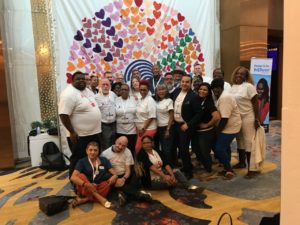 Several of our 50+ Scholars at USCA have shared their stories of what attending the conference meant to them. We’re happy to share them with you now.
Several of our 50+ Scholars at USCA have shared their stories of what attending the conference meant to them. We’re happy to share them with you now.